- Home
- Ken Follett
Fall of Giants (The Century Trilogy) Page 13
Fall of Giants (The Century Trilogy) Read online
Page 13
A silence descended that made Grigori scared. He stared at the rifles pointed at him, and the riflemen stared back expressionlessly, like statues.
Then Grigori heard a bugle call.
It was a signal. The soldiers fired their weapons. All around Grigori, people screamed and fell. A boy who had climbed a statue for a better view cried out and tumbled to the ground. A child fell out of a tree like a shot bird.
Grigori saw Ma go facedown. Thinking she was avoiding the gunfire, he did the same. Then, looking at her as they both lay on the ground, he saw the blood, bright red on the snow around her head.
"No!" he shouted. "No!"
Lev screamed.
Grigori grabbed Ma's shoulders and pulled her up. Her body was limp. He stared at her face. At first he was bewildered by the sight that met his eyes. What was he seeing? Where her forehead and her eyes should have been there was just a mass of unrecognizable pulp.
It was Lev who grasped the truth. "She's dead!" he screamed. "Ma's dead, my mother is dead!"
The firing stopped. All around, people were running, limping, or crawling away. Grigori tried to think. What should he do? He must take Ma away from here, he decided. He put his arms under her and picked her up. She was not light, but he was strong.
He turned around, looking for the way home. His vision was strangely blurred, and he realized he was weeping. "Come on," he said to Lev. "Stop screaming. We have to go."
At the edge of the square they were stopped by an old man, the skin of his face creased around watery eyes. He wore the blue tunic of a factory worker. "You're young," he said to Grigori. There was anguish and rage in his voice. "Never forget this," he said. "Never forget the murders committed here today by the tsar."
Grigori nodded. "I won't forget, sir," he said.
"May you live long," said the old man. "Long enough to take revenge on the bloodstained tsar for the evil he has done this day."
{ VIII }
"I carried her for about a mile, then I got tired, so I boarded a streetcar, still holding her," Grigori told Katerina.
She stared at him. Her beautiful, bruised face was pale with horror. "You carried your dead mother home on a streetcar?"
He shrugged. "At the time I had no idea I was doing anything strange. Or, rather, everything that happened that day was so strange that nothing I did seemed odd."
"What about the people riding the car?"
"The conductor said nothing. I suppose he was too shocked to throw me off, and he didn't ask me for the fare--which I would not have been able to pay, of course."
"So you just sat down?"
"I sat there, with her body in my arms, and Lev beside me, crying. The passengers just stared at us. I didn't care what they thought. I was concentrating on what I had to do, which was to get her home."
"And so you became the head of your family, at the age of sixteen."
Grigori nodded. Although the memories were painful, he felt the most intense pleasure from her concentrated attention. Her eyes were fixed on him, and she listened with her mouth open and a look on her lovely face of mingled fascination and horror.
"What I remember most about that time is that no one helped us," he said, and he was revisited by the panicky feeling that he was alone in a hostile world. The memory never failed to fill his soul with rage. It's over now, he told himself; I've got a home and a job, and my brother has grown up strong and handsome. The bad times are over. But nevertheless he wanted to take someone by the neck--a soldier, a policeman, a government minister, or the tsar himself--and squeeze until there was no life left. He closed his eyes, shuddering, until the feeling passed.
"As soon as the funeral was over, the landlord threw us out, saying we would not be able to pay; and he took our furniture--for back rent, he said, although Ma was never behind with payments. I went to the church and told the priest we had nowhere to sleep."
Katerina laughed harshly. "I can guess what happened there."
He was surprised. "Can you?"
"The priest offered you a bed--his bed. That's what happened to me."
"Something like that," Grigori said. "He gave me a few kopeks and sent me to buy hot potatoes. The shop wasn't where he said, but instead of searching for it I hurried back to the church, because I didn't like the look of him. Sure enough, when I went into the vestry he was taking Lev's trousers down."
She nodded. "Priests have been doing that sort of thing to me since I was twelve."
Grigori was shocked. He had assumed that that particular priest was uniquely evil. Katerina obviously believed that depravity was the norm. "Are they all like that?" he said angrily.
"Most of them, in my experience."
He shook his head in disgust. "And you know what amazed me the most? When I caught him, he wasn't even ashamed! He just looked annoyed, as if I had interrupted him while he was meditating on the Bible."
"What did you do?"
"I told Lev to do up his trousers, and we left. The priest asked for his kopeks back, but I told him they were alms for the poor. I used them to pay for a bed in a lodging house that night."
"And then?"
"Eventually I got a good enough job, by lying about my age, and I found a room, and I learned, day by day, how to be independent."
"And now you're happy?"
"Certainly not. My mother intended us to have a better life, and I'm going to make sure of it. We're leaving Russia. I've saved up almost enough money. I'm going to America, and when I get there I'll send money back for a ticket for Lev. They have no tsar in America--no emperor or king of any kind. The army can't just shoot anyone they like. The people rule the country!"
She was skeptical. "Do you really believe that?"
"It's true!"
There was a tap at the window. Katerina was startled--they were on the second floor--but Grigori knew it was Lev. Late at night, when the door of the house was locked, Lev had to cross the railway line to the backyard, climb onto the washhouse roof, and come in through the window.
Grigori opened up and Lev climbed in. He was dressed smartly, in a jacket with mother-of-pearl buttons and a cap with a velvet band. His waistcoat sported a brass watch chain. His hair was cut in the fashionable "Polish" style with a parting at the side, instead of down the middle as the peasants wore it. Katerina looked surprised, and Grigori guessed she had not expected his brother to be so dashing.
Normally Grigori was pleased to see Lev, and relieved if he was sober and in one piece. Now he wished he could have had longer alone with Katerina.
He introduced them, and Lev's eyes gleamed with interest as he shook her hand. She wiped tears from her cheeks. "Grigori was telling me about the death of your mother," she explained.
"He has been mother and father to me for nine years," Lev said. He tilted his head and sniffed the air. "And he makes good stew."
Grigori got out bowls and spoons, and put a loaf of black bread on the table. Katerina explained to Lev about the fight with the policeman Pinsky. The way she told the story made Grigori seem braver than he felt, but he was happy to be a hero in her eyes.
Lev was enchanted by Katerina. He leaned forward, listening as if he had never heard anything so fascinating, smiling and nodding, looking amazed or disgusted, according to what she was saying.
Grigori spooned the stew into bowls and pulled the packing case up to the table for use as a third chair. The food was good: he had added an onion to the pot, and the ham bone gave a hint of meaty richness to the turnips. The atmosphere lightened as Lev talked of inconsequential matters, odd incidents at the factory and funny things people said. He kept Katerina laughing.
When they had finished, Lev asked Katerina how she came to be in the city.
"My father died and my mother remarried," she said. "Unfortunately, my stepfather seemed to like me better than my mother." She tossed her head, and Grigori could not tell whether she was ashamed or defiant. "At any rate, that's what my mother believed, and she threw me out."
Grigor
i said: "Half the population of St. Petersburg have come here from a village. Soon there will be no one left to till the soil."
Lev said: "What was your journey like?"
It was a familiar tale of third-class railway tickets and lifts begged on carts, but Grigori was mesmerized by her face as she talked.
Once again Lev listened with rapt attention, making amusing comments, asking the occasional question.
Soon, Grigori noticed, Katerina had turned in her seat and was talking exclusively to Lev.
Almost, Grigori thought, as if I was not even here.
CHAPTER FOUR
March 1914
"So," Billy said to his father, "all the books of the Bible were originally written in various languages and then translated into English."
"Aye," said Da. "And the Roman Catholic Church tried to ban translations--they didn't want people like us reading the Bible for ourselves and arguing with the priests."
Da was a bit un-Christian when he spoke of Catholics. He seemed to hate Catholicism more than atheism. But he loved an argument. "Well, then," said Billy, "where are the originals?"
"What originals?"
"The original books of the Bible, written in Hebrew and Greek. Where are they kept?"
They were sitting on opposite sides of the square table in the kitchen of the house in Wellington Row. It was midafternoon. Billy was home from the pit and had washed his hands and face, but still wore his work clothes. Da had hung up his suit jacket, and sat in his waistcoat and shirtsleeves, with a collar and tie--he would be going out again after dinner, to a union meeting. Mam was heating the stew on the fire. Gramper sat with them, listening to the discussion with a faint smile, as if he had heard it all before.
"Well, we don't have the actual originals," Da said. "They wore out, centuries ago. We have copies."
"Where are the copies, then?"
"All different places--monasteries, museums . . . "
"They should be kept in one place."
"But there's more than one copy of each book--and some are better than others."
"How can one copy be better than another? Surely they're not different."
"Yes. Over the years, human error crept in."
This startled Billy. "Well, how do we know which is right?"
"That's a study called textual scholarship--comparing the different versions and coming up with an agreed text."
Billy was shocked. "You mean there isn't an indisputable book that is the actual Word of God? Men argue about it and make a judgment?"
"Yes."
"Well, how do we know they're right?"
Da smiled knowingly, a sure sign that his back was to the wall. "We believe that if they work in prayerful humility, God will guide their labors."
"But what if they don't?"
Mam put four bowls on the table. "Don't argue with your father," she said. She cut four thick slices off a loaf of bread.
Gramper said: "Leave him be, Cara my girl. Let the boy ask his questions."
Da said: "We have faith in God's power to ensure that his Word comes to us as he would wish."
"You're completely illogical!"
Mam interrupted again. "Don't speak to your father like that! You're still a boy, you don't know anything."
Billy ignored her. "Why didn't God guide the labors of the copiers, and stop them making mistakes, if he really wanted us to know His Word?"
Da said: "Some things are not given to us to understand."
That answer was the least convincing of all, and Billy ignored it. "If the copiers could make mistakes, obviously the textual scholars could too."
"We must have faith, Billy."
"Faith in the Word of God, yes--not faith in a lot of professors of Greek!"
Mam sat at the table and pushed her graying hair out of her eyes. "So you are right, and everyone else is wrong, as usual, I suppose?"
This frequently used ploy always stung him, because it seemed justified. It was not possible that he was wiser than everyone else. "It's not me," he protested. "It's logic!"
"Oh, you and your old logic," said his mother. "Eat your dinner."
The door opened and Mrs. Dai Ponies walked in. This was normal in Wellington Row: only strangers knocked. Mrs. Dai wore a pinafore and a man's boots on her feet: whatever she had to say was so urgent that she had not even put on a hat before leaving her house. Visibly agitated, she brandished a sheet of paper. "I'm being thrown out!" she said. "What am I supposed to do?"
Da stood up and gave her his chair. "Sit down by here and catch your breath, Mrs. Dai Ponies," he said calmly. "Let me have a read of that letter, now." He took it from her red, knotted hand and laid it flat on the table.
Billy could see that it was typed on the letterhead of Celtic Minerals.
"'Dear Mrs. Evans,'" Da read aloud. "'The house at the above address is now required for a working miner.'" Celtic Minerals had built most of the houses in Aberowen. Over the years, some had been sold to their occupiers, including the one the Williams family lived in; but most were still rented to miners. "'In accordance with the terms of your lease, I--'" Da paused, and Billy could see he was shocked. "'I hereby give you two weeks' notice to quit!'" he finished.
Mam said: "Notice to quit--and her husband buried not six weeks ago!"
Mrs. Dai cried: "Where am I to go, with five children?"
Billy was shocked, too. How could the company do this to a woman whose husband had been killed in their pit?
"It's signed 'Perceval Jones, Chairman of the Board,' at the bottom," Da finished.
Billy said: "What lease? I didn't know miners had leases."
Da said to him: "There's no written lease, but the law says there's an implied contract. We've already fought that battle and lost." He turned to Mrs. Dai. "The house goes with the job, in theory, but widows are usually allowed to stay on. Sometimes they leave anyway, and go to live elsewhere, perhaps with their parents. Often they remarry, to another miner, and he takes over the lease. Usually they have at least one boy who becomes a miner when he's old enough. It's not really in the company's interest to throw widows out."
"So why do they want to get rid of me and my children?" wailed Mrs. Dai.
Gramper said: "Perceval Jones is in a hurry. He must think the price of coal is going up. That'll be why he started the Sunday shift."
Da nodded. "They want higher production, that's for sure, whatever the reason. But they're not going to get it by evicting widows." He stood up. "Not if I can help it."
{ II }
Eight women were being evicted, all widows of men who had died in the explosion. They had received identical letters from Perceval Jones, as Da established that afternoon when he visited each woman in turn, taking Billy with him. Their reactions varied from the hysterics of Mrs. Hywel Jones, who could not stop crying, to the grim fatalism of Mrs. Roley Hughes, who said this country needed a guillotine like they had in Paris for men like Perceval Jones.
Billy was boiling with outrage. Was it not enough that these women had lost their men to the pit? Must they be homeless as well as husbandless? "Can the company do this, Da?" he said as he and his father walked down the mean gray terraces to the pithead.
"Only if we let them, boy. The working class are more numerous than the ruling class, and stronger. They depend on us for everything. We provide their food and build their houses and make their clothes, and without us they die. They can't do anything unless we let them. Always remember that."
They went into the manager's office, stuffing their caps into their pockets. "Good afternoon, Mr. Williams," said Spotty Llewellyn nervously. "If you would just wait a minute, I'll ask if Mr. Morgan can see you."
"Don't be daft, boy, of course he'll see me," said Da, and without waiting he walked into the inner office. Billy followed.
Maldwyn Morgan was looking at a ledger, but Billy had a feeling he was only pretending. He looked up, his pink cheeks closely shaved as always. "Come in, Williams," he said unnecessarily. Unlike many m
en, he was not afraid of Da. Morgan was Aberowen-born, the son of a schoolmaster, and had studied engineering. He and Da were similar, Billy realized: intelligent, self-righteous, and stubborn.
"You know what I've come about, Mr. Morgan," said Da.
"I can guess, but tell me anyway."
"I want you to withdraw these eviction notices."
"The company needs the houses for miners."
"There will be trouble."
"Are you threatening me?"
"Don't get on your high horse," Da said mildly. "These women lost their husbands in your pit. Don't you feel responsible for them?"
Morgan tilted up his chin defensively. "The public inquiry found that the explosion was not caused by the company's negligence."
Billy wanted to ask him how an intelligent man could say such a thing and not feel ashamed of himself.
Da said: "The inquiry found a list of violations as long as the train to Paddington--electrical equipment not shielded, no breathing apparatus, no proper fire engine--"
"But the violations did not cause the explosion, or the deaths of miners."
"The violations could not be proved to have caused the explosion or the deaths."
Morgan shifted uncomfortably in his chair. "You didn't come here to argue about the inquiry."
"I came here to get you to see reason. As we speak, the news of these letters is going around the town." Da gestured at the window, and Billy saw that the winter sun was going down behind the mountain. "Men are rehearsing with choirs, drinking in pubs, going to prayer meetings, playing chess--and they're all talking about the eviction of the widows. And you can bet your boots they're angry."
"I have to ask you again: are you trying to intimidate the company?"
Billy wanted to throttle the man, but Da sighed. "Look here, Maldwyn, we've known each other since school days. Be reasonable, now. You know there are men in the union who will be more aggressive than me." Da was talking about Tommy Griffiths's father. Len Griffiths believed in revolution, and he always hoped the next dispute would be the spark that lit the conflagration. He also wanted Da's job. He could be relied upon to propose drastic measures.

 The Pillars of the Earth
The Pillars of the Earth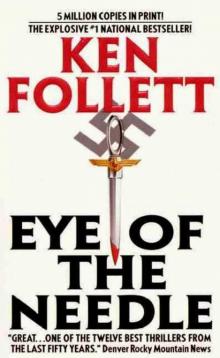 Eye Of The Needle
Eye Of The Needle Lie Down With Lions
Lie Down With Lions Winter of the World
Winter of the World Triple
Triple World Without End
World Without End Fall of Giants
Fall of Giants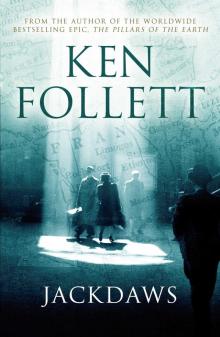 Jackdaws
Jackdaws Hornet Flight
Hornet Flight Whiteout
Whiteout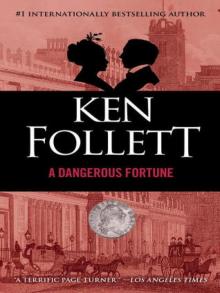 A Dangerous Fortune
A Dangerous Fortune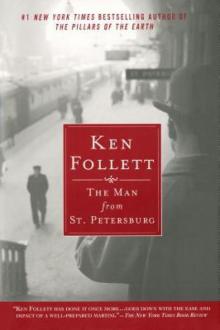 The Man From St. Petersburg
The Man From St. Petersburg A Column of Fire
A Column of Fire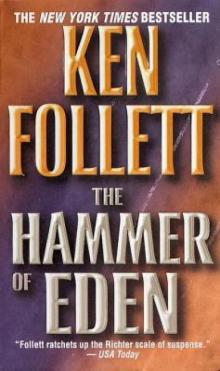 The Hammer of Eden
The Hammer of Eden On Wings of Eagles
On Wings of Eagles The Evening and the Morning
The Evening and the Morning The Key to Rebecca
The Key to Rebecca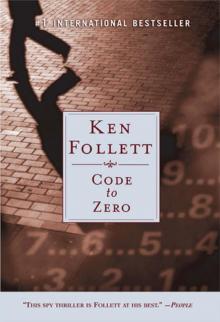 Code to Zero
Code to Zero Paper Money
Paper Money A Place Called Freedom
A Place Called Freedom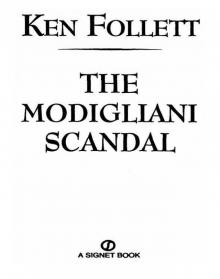 The Modigliani Scandal
The Modigliani Scandal Triple (1991)
Triple (1991)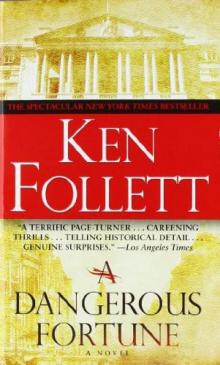 A Dangerous Fortune (1994)
A Dangerous Fortune (1994)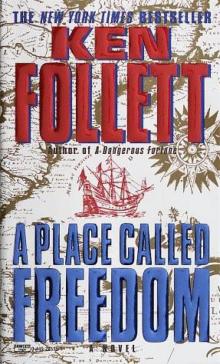 A Place Called Freedom (1995)
A Place Called Freedom (1995)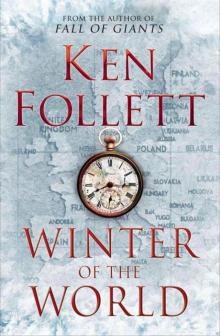 Winter of the World (Century Trilogy 2)
Winter of the World (Century Trilogy 2) Code to Zero (2000)
Code to Zero (2000) On Wings Of Eagles (1990)
On Wings Of Eagles (1990) Storm Island
Storm Island Fall of Giants (The Century Trilogy)
Fall of Giants (The Century Trilogy)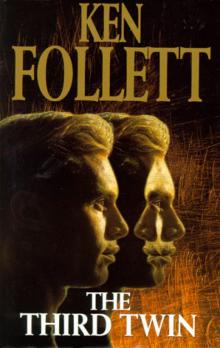 the Third Twin (1996)
the Third Twin (1996)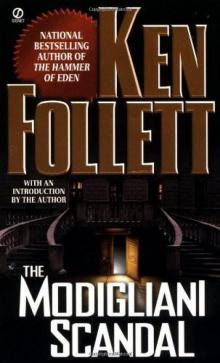 The Modigliani Scandal (1976)
The Modigliani Scandal (1976) Night Over Water
Night Over Water